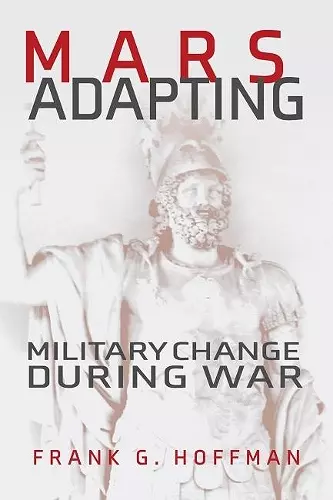Mars Adapting
Military Change During War
Format:Hardback
Publisher:Naval Institute Press
Published:28th Feb '21
Currently unavailable, our supplier has not provided us a restock date

As Clausewitz observed, ""In war more than anywhere else, things do not turn out as we expect."" The essence of war is a competitive reciprocal relationship with an adversary. Commanders and institutional leaders must recognize shortfalls and resolve gaps rapidly in the middle of the fog of war. The side that reacts best (and absorbs faster) increases its chances of winning.
Mars Adapting examines what makes some military organizations better at this contest than others. It explores the institutional characteristics or attributes at play in learning quickly. Adaptation requires a dynamic process of acquiring knowledge, the utilization of that knowledge to alter a unit's skills, and the sharing of that learning to other units to integrate and institutionalize better operational practice.
Mars Adapting explores the internal institutional factors that promote and enable military adaptation. It employs four cases, drawing upon one from each of the U.S. armed services. Each case was an extensive campaign, with several cycles of action/counteraction. In each case, the military institution entered the war with an existing mental model of the war they expected to fight. For example, the U.S. Navy prepared for decades to defeat the Japanese Imperial Navy and had developed carried-based aviation. Other capabilities, particularly the Fleet submarine, were applied as a major adaptation.
The author establishes a theory called Organizational Learning Capacity that captures the transition of experience and knowledge from individuals into larger and higher levels of each military service through four major steps. The learning/change cycle is influenced, he argues, by four institutional attributes (leadership, organizational culture, learning mechanisms, and dissemination mechanisms). The dynamic interplay of these institutional enablers shaped their ability to perceive and change appropriately.
In this original and important study, Frank Hoffman shows how a military's ability to adapt under fire is shaped by organisational capacities to learn lessons in war. With fascinating case studies of the U.S. armed services in World War II, Korea, Vietnam, and Iraq, this is an essential read for students of military innovation." —Theo Farrell, professor and deputy vice-chancellor, University of Wollongong and former head of the Department of War Studies, King's College London
"An excellent work! Hoffman takes a refreshing view that balances military adaptation in wartime with substantial research from the field of organizational learning. This allows Hoffman to provide a new and extremely relevant perspective. Mars Adapting is an important contribution and essential reading for anyone interested in military adaptation." —Trent Hone, author of Learning War: The Evolution of Fighting Doctrine in the U.S. Navy, 1898-1945 and co-author of Battle Line: The United States Navy, 1919-1939
"This work is going to become a classic of use to any of those who are interested in improving the performance of America's military institutions in war. Frank Hoffman has written an outstanding examination of the problems and issues involved in innovation and adaptation. His case studies come from all four of the U.S. services and provide wonderful insights into the actual difficulties that war presents to learning organizations." —Williamson Murray, professor emeritus at The Ohio State University
ISBN: 9781682475898
Dimensions: unknown
Weight: 716g
368 pages